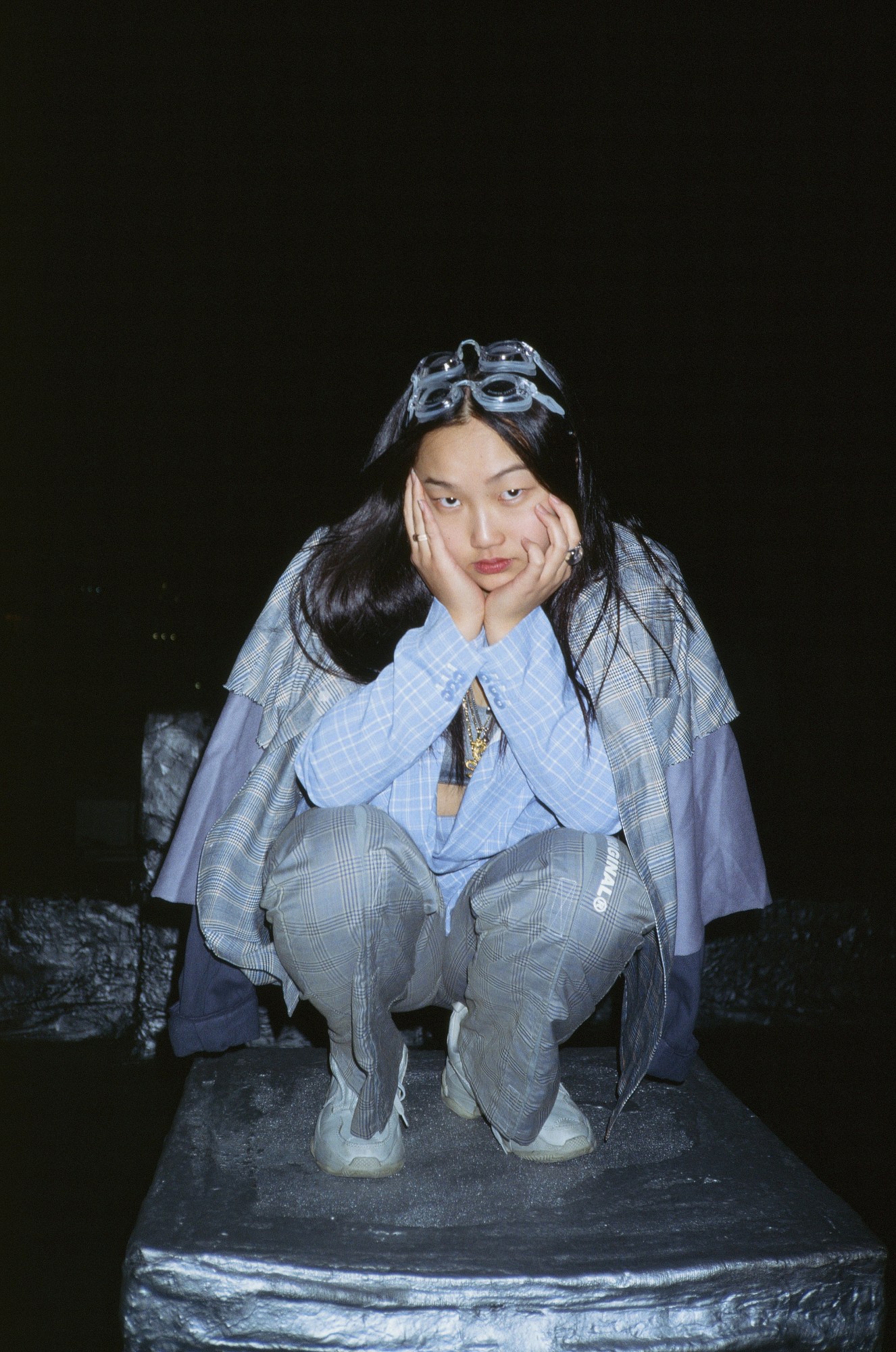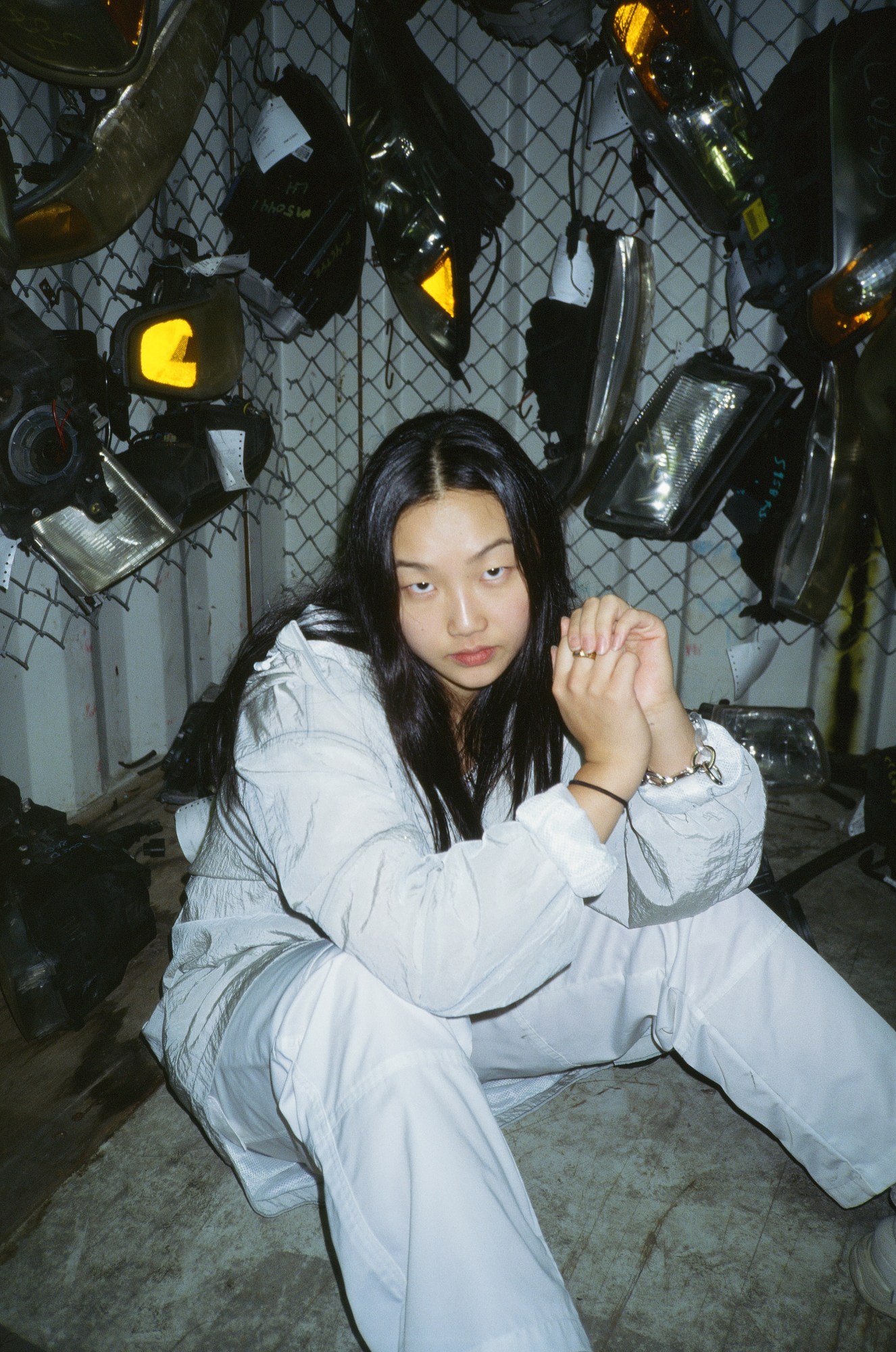When I meet rising alt-R&B artist Audrey Chu at a local Brooklyn diner one Tuesday night, the first thing I notice is how much she just belongs. At only 20 years old, the young Korean-American musician — who goes by the mononym of her first name — lacks the awkwardness that comes with discovering yourself in young adulthood. Rather, Audrey rocks a style and confidence that belies her age, an energy that’s palpable in her full, soulful voice, and complex lyricism.
Not one to be boxed in, the New Jersey native boasts a surprisingly diverse sound that pushes the boundaries of what it means to be a contemporary R&B artist. From playful, bouncy tracks like “Soufflé” to the pop-reminiscent “Empty Hands,” Audrey and her Roc-Nation producer/manager Anwar Sawyer coalesce a multitude of different elements to create a rich universe of sound. And she takes that even further on her new single “Comic Sans” with rapper Jack Harlow.
Since leaving New York University’s Clive Davis Institute of Recorded Music to pursue her art full time, Audrey’s been making big waves in the music industry: She signed with Sony’s Arista Records, released her critically acclaimed single “Time,” and even co-directed a music video with Grammy-nominated director Emma Westernberg (of Janelle Monáe’s “PYNK”). We can’t wait to see what she does next.
Check out Audrey’s new single and read i-D’s chat with her below.
When did you start making music?
Honestly, I can’t remember when I started singing—I always loved it. Growing up, I remember my mom taking me to voice lessons; it was just such a natural part of what I did. But when I got to high school, I started having this urge to make my own music. I don’t know where it came from—I was just like, that’s what I’m supposed to do. I started posting a lot of covers on Instagram and eventually my manager [and producer Anwar Swyer] DM’d me. The first time I met him, we wrote a song, just instantaneously. There was definitely creative chemistry, and we started producing songs, playing shows, and now I’m here eating this mac n cheese. [ Laughs] It’s kind of a classic singer turned into songwriter story.
When did you start writing your own music?
I started in high school, but I feel like I started actually liking my songs maybe when I turned 18. Before that point, they were super corny trash I would never show anyone.
Like kinda cringe?
They’re so cringe, oh my god. Only a few people know about those songs—hopefully they don’t leak them. They’re terrible, so naive. I wrote a song about bullying. I think it’s really hard to write a song about bullying and have it not be corny, and I totally failed. It was corny as fuck. I don’t even want to tell you anymore! [Laughs] I’m not ashamed though, it was who I was back then.
What were some sonic influences that you had growing up?
Sonic, that’s such a great word. To be honest, I didn’t listen to that much music growing up. My mom and dad didn’t have specific singers or musicians that they liked, so they just fed me what was popular. I really had to go out of my way when I got to high school to find artists I really liked. High school is when i found Sade, Jhené, Thundercat, Kanye. And then when I got to college it was just more of that, finding the sounds that I liked.
Is there a particular genre you’re drawn to?
I listen to whatever makes me feel good. I wouldn’t say I could put a genre on what I like or what I take from, which is why my music sounds the way it does—it’s just like, what is happening? You know, that feeling.
I feel like you can hear these different influences in your music. There’s trap, there’s softer, ballad-like stuff. It’s all in there. Where does that come from?
I wish I knew—it’s so weird because I don’t think about it [when making music]. I just do it. And I can only understand it looking back like wow, there’s all these different influences. I think it really is what I listen to, I’m inspired by it, and I spit it back out in my way. It comes through my body, so it has to come out differently than the way it came in. But I don’t really think about it too much. The only time that it’s ever worked for me is this song called “Park Nine.” Actually, it’s one of my favorite songs I’ve ever written. Going into it, I was listening to a lot of Sade, and I was like, I want this to sound like what Sade would do if she was making music now, in this space. I’m not sure if it’s gonna be a single or on the album when it comes out, I haven’t decided yet.

In your latest single “Comic Sans,” you’re actually rapping. Was that out of your comfort zone?
When I’m writing, it’s one of the few times in my life when I don’t really have a comfort zone—I’ll just do whatever. For “Comic Sans,” I remember the day so clearly. Anwar was making the beat, and I kept trying to sing over it, but nothing worked. So as a joke, I just started rapping, and it just stuck. I wouldn’t call myself a rapper at all though. I think I just do whatever I want on a song, and if that’s rapping, cool. If it’s yodeling, cool. If it’s farting, cool.
Are there certain stories you try to tell with your music?
Looking back on this project that’s about to come out, there’s a lot of themes of being an outcast. I think that makes perfect sense because this is the first year that I’ve lived by myself. I felt this liberation in being exiled—it was self-induced exile in a way, because I chose to move out—and that honestly leaked into every corner of every song. I didn’t even realize that until my dear friend Khufu told me to listen to the project and think about conceptually what this universe is about. I [originally] thought it was so random, all the songs. But looking back, there’s a clear theme of being an outcast. Like oh, that’s great. [Laughs] Just great.
It’s definitely important to work through and talk about those experiences.
Oh yeah, I mean I had to—I don’t think I would’ve made it through this year healthily if I didn’t write those songs. Something I learned about myself this year is that I’m such an internalizer, more than I ever realized. The only time that stuff leaks out of me is when I make music. But that’s something I want to work on. I think being able to cope with music is a blessing, but it’s even better if you can communicate outside of that. I need writing though. It’s just something I need to do.
Do you feel like being Korean American also influences your work and writing?
Oh my god, absolutely. It’s who I am, so it leaks into what I make. But I wouldn’t say it’s more influential than any other part of my identity—it hasn’t influenced me anymore than being female, or growing up with two siblings. It’s very organic. If were to try to pinpoint specific things, it’d be hard for me because it’s just so intertwined with everything else. It’s not like a calculative thing like, oh, I’m gonna do this because I’m Korean-American.
Definitely, every Asian American is going to have a different way that manifests. What’s your creative process for writing and recording?
A lot of times, I’ll be with a producer or beatmaker. I’ll write a song over it as they make a beat, and there’s usually a moment for me where it clicks—sometimes there isn’t, there are songs or beats I don’t necessarily respond to. But I know I resonate with something once I start seeing a visual to it. I’m a really visually driven person. Melodies are very natural to me so I could just do that whenever. But to really write something, to put words to it, I feel like I need to see it.
You need to be able to see the story arc come out.
There’s this one song on the project, “Irene”, that’s about catching someone cheat on you—it’s totally fantasy, that’s never happened to me before. But as soon as I heard this one guitar part on there, I could see someone outside of a shady motel seeing their person walk away with someone else. It’s really vivid, and the whole song just kind of falls into place after that, but [that process] is different every time.
I feel like that ties in perfectly with your videos. They’re so interesting and ethereal and compelling in a way that’s hard to understand because they’re really abstract too.
That’s really interesting because a lot of times, the video won’t be what I originally saw when I was writing the song. Sometimes it logistically doesn’t work, and other times it feels too easy, like, of course I would do that, so I [purposely] choose not to.
When did you know you wanted to pursue music full time?
When I was in school at NYU, I would take the A train after doing all my homework to 175th at 10 p.m., take the bus across the bridge, then Uber to the studio and pretty much work all night. Then I’d take the 4 a.m. bus back, get some sleep, go to class. And that was just—I just felt like I was half into school and fully pursuing music. So I just kinda put my foot down and said, I’m just gonna pick one. So I convinced my dad to let me take a gap year.
How’d you do that? I feel like it’d be hard to convince my Asian parents to do that.
I made a Google Slides presentation to convince him to let me do it. I basically proved to him that I could spend less money living outside of school, not going to NYU. I used pie charts and unnecessary graphs—It was really just a testament to how serious I was about it more so than anything. But that shit worked. [ Laughs] I picked the fonts, the colors, Google Slides themes—and it worked!
What’s your journey been like since then?
It’s been amazing. Definitely challenging, oh my god. But I really don’t have complaints. It’s been every challenge that I want in my life so far. Something I realized is that making music and making a career out of music are very different things. But I always want it to keep it about [making music]. Forever. I decided that this year. Because I love doing this so much, and I don’t want to—I’m never going to ruin this for myself.
